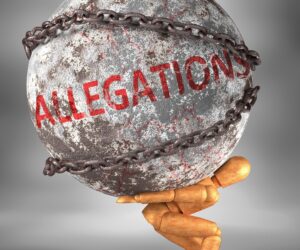
False accusations can ruin your life, even if they don’t end up leading to criminal charges. However, when these accusations result in your arrest or a pending criminal investigation, you need to take some specific steps to help protect yourself from these harmful allegations. In today’s blog, we take a closer look at the steps you should take if your find yourself facing false or harmful accusations.
I’ve Been Falsely Accused
It’s not uncommon for a client to walk into our office and tell us that they’ve been falsely accused of a crime. Sometimes they are being thrown under the bus by the real perpetrator, while other times a bitter divorce can lead to the other side making some false claims against you in hopes of achieving a more favorable division of assets or custody agreement. So what should you do if you have been falsely accused of a crime?
Stay Quiet – If you are arrested by police who are acting on bad or false information, now is not the time to try to clear everything up. It’s unlikely that you are going to be able to talk your way out of false domestic violence accusations or a similar type of charge, but you can end up saying something you regret in the heat of the moment because you’re angry. Provide police with basic information like your name and address, but if they start asking questions for specifics, just say that the accusations are not true and that you’d like to contact your lawyer.
Get A Lawyer – You may be annoyed at the thought of retaining legal counsel even though you’re being falsely accused, but you need to have a professional in your corner when the stakes are high. Don’t assume that the judge will take your version of events as the truth. Hire a lawyer and make sure that your defense is air tight. Your lawyer will know how to put forth a strong case that proves your innocence. The prosecution will have a legal team, so you need to have one too.
Write Down Your Truth – Oftentimes it’s helpful to put pen to paper and make sure that no details of the event in question becomes fuzzy. Write down your story or your alibi, and include dates, times and witnesses so that your memory doesn’t start to fade. We understand it can be tough to write about an incident if it never took place and you were falsely accused, but if there is any information that can help your case, write it down and give it to your lawyer.
Do Not Contact – Finally, do not try to contact the alleged victim until the case plays out. It’s never a good look, and it can come off as an intimation tactic, even if you’re only trying to reach out to clear up some confusion. Any discourse between the two parties will be between your legal teams. Do not reach out to the accuser under any circumstances while the case is pending.
We’ve helped a number of individuals get the justice they deserve after being falsely accused, and we can do the same for you. For more information, or if you need help with a legal matter, reach out to Avery and the team at Appelman Law Firm today at (952) 224-2277.





